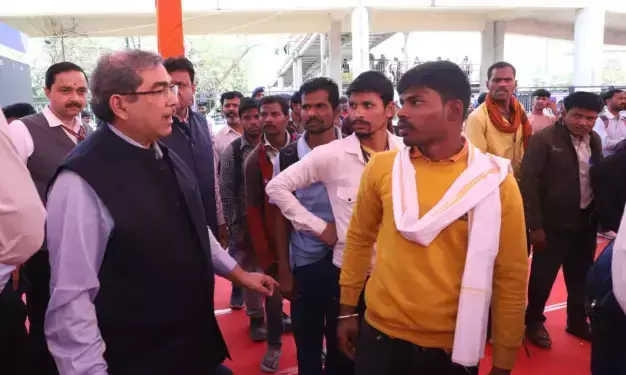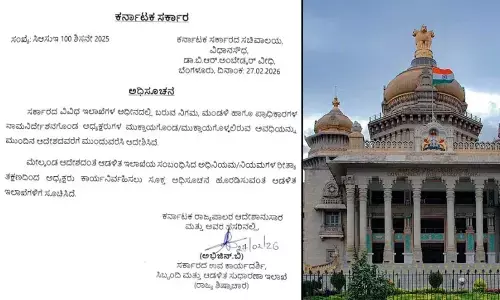Time to see brighter sides of the Covid-19 pandemic

Kurnool: Encephalitis turns fatal for coronavirus cases
The world on the cusp of new globalisation in digital way; for some, home will be the permanent office
India's Covid-19 trajectory is on expected lines. Our country recently crossed Brazil in novel coronavirus caseload to second place with over 53 lakh cases now. This dubious distinction will not end here though. India will soon cross the US and emerge at the top of the world's Covid tally list. That's but natural as our nation is adding nearly one lakh new infections every single day.
And the daily count is set to go up further. There are good reasons for it. India is a fertile ground for any pandemic or contagious disease because of the geographical and economic reasons that prevail. It's the same with Covid-19 as well. Our nation is home to the second highest population after China. But in the land area, we are far behind our communist neighbour and the US, the world's third largest populated nation. India's total land area is 3.287 million square kilometres. Compare that with China. The communist country, with a land area of 9.597 mnsq km, is 2.9 times bigger than India. But the population difference between the two nations is just 60 million (6 crore). The US, whose population (33 crore) equals to less than one-fourth of India's, is three times bigger than our country in land area (9.833 mnsq km).
Therefore, population density, at 500 people per km, in India is very high compared to the US (34/km) and China (145/km). Moreover, we are saddled with poverty and a poor healthcare ecosystem that borders on dysfunction at times. The less we talk about our currency the better. Thanks to our ever-depreciating rupee, salaries in India are the lowest in the world. Of course, they fell further now. Due to low income sources, majority of people look for debt whenever they or their family members fall sick. Besides, per capita living space in India is dismal, to say the least. These factors mean India has all the requisite ingredients that could spread the invisible enemy at a jet speed.
However, there is a brighter side as well to India's grim Covid story. Thankfully, mortality rate is comparatively low in India even if we take into consideration the handiwork of some State governments to suppress Covid death toll. This low mortality rate is neither because of our healthcare system's efficiency nor because of our administration's effectiveness. It's because of the demographic dividend India enjoys currently. As much as 62.5 per cent of our population is in the prime age group of 15-59 years. Further, people aged 65 and above, who are said to be more vulnerable to Covid, are just 5.3 per cent of the total population. This population mix has come to India's rescue during these trying times.
Anyway, India is already into the ninth month of the chaotic Covid world. So, it's time to see other brighter sides of the pandemic instead of focusing excessively on doomsday scenarios, as we eagerly wait for the proverbial defence called vaccine. I am not saying here that the vaccine will be a reality. Till date, not many vaccines have been effective against virus infections. Therefore, we need to keep our fingers crossed. Coming to the positive sides of the pandemic, people are spending more time at home. So, traffic is relatively less on the roads these days. For many, home has become the new office. Software major Tata Consultancy Services (TCS) announced that nearly 75 per cent of its total employees would permanently work from home by 2025. Many more software companies may follow suit. So, there will be no Monday blues for those who permanently work from home! No surprise if the US companies recruit Indians and ask them to work from home in India instead of going to the US on one visa or the other. Getting a US work visa is a Herculean task these days, isn't it? Online meetings and education will be the new norm. Globally reputed universities may also launch 'Study From Home' courses as students can attend online classes from anywhere in the world. That way, the world is on the cusp of a new wave of globalization in digital way. This would not have been possible but for the Covid-19 pandemic. Despite ravaging the world, the pandemic has opened doors for new opportunities and avenues.
And such developments will lead to revolutionary changes in work culture and working dynamics in every field. It's very likely that all the jobs in all the sectors that can be executed remotely will be shifted to 'Work From Home' model. Online shopping will gain further traction. Such drastic changes in lifestyles will lead to lesser traffic on roads and lower pressure on public transport systems.
Recently, I happened to go to some interior places in Telangana. In villages, labour shortage is a perennial problem. More so for the agriculture sector. With many students and those who lost their jobs in cities returning to their homes in villages, agriculture activity is getting a steady supply of labour now. However, not many people are going out for shopping and eating. There are no tours and pleasure trips. For god's sake, movie theatres are closed. Our world is a quieter place now. More so are the densely populated cities and towns. It's time to soak in this quietness and enjoy it as there is every chance of some things going back to old ways in the post-Covid world.
Of course, these unprecedented times have brought a lot of pain to businessmen and entrepreneurs as hotels and restaurants are closed, the transportation sector is in doldrums and tourism came to a standstill. Shopping mall operators are in a dilemma whether to open them or keep them shut as people cut consumer spending. Millions have lost their jobs and with it, their livelihoods. However, there is no way out from this pain unless the governments chip in.
Therefore, saying economy is in tatters is an understatement. It's in total chaos. India may need at least two to three years to recover the lost ground as the impact of the Wuhan, China-born coronavirus on the Indian economy is more severe than on other nations including the US, the world's largest economy. But there is no escape route. India will have to live with the virus and the economic destruction that it has brought on us.
So, the only thing we can do now is to stay positive and move on. But we need to take enough precautions and preventive steps not to be in Covid positive territory. For, Covid positive means one will be in negative territory for at least two weeks and if one gets unlucky, beyond. Be positive in life, but don't become Covid positive. Surprisingly, most of the powerful leaders across India have suddenly gone silent on the Covid pandemic and some of them are also behaving as if nothing is happening around them and everything is safe. But people are really worried about what is in store for them and when this crisis will be over. A reassuring word will go a long way in infusing optimism among them. Let's hope something of that sort will happen soon.










